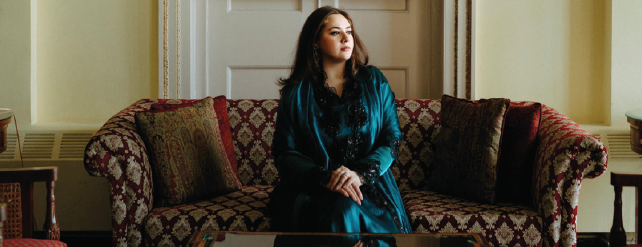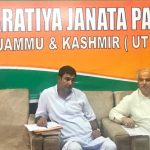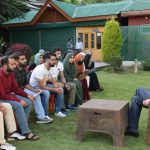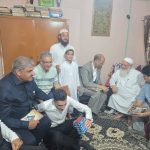After years of flying across the Indian subcontinent, commercial pilot Captain TanviRaina is charting a new course, this time, through Kashmir’s workshops, drawing rooms, and courtyards.
Raina, who continues to fly with IndiGo, has quietly spent the last three years building Bharat &Tanvi, a design house deeply rooted in her family’s history and the legacy of an old transport business once based in LalChowk. Now, she is preparing to launch KasbaurKalam,a series of unscripted conversations with Kashmiri artisans, musicians, writers, and designers, aimed at bringing the Valley’s creative voices to national and global platforms.
“I wanted to pay tribute to my grandfather,” Raina told Rising Kashmir. “His Bharat Transport Company was a familiar name in LalChowk. I never met him, but naming the brand Bharat &Tanvi was my way of carrying that legacy forward. This project is both a family tribute and a practical intervention for craftspeople.”
Unlike conventional interview formats, KasbaurKalam will remain open-ended, allowing creators to speak candidly about their journeys—exploring not just craft, but also the economic, emotional, and mental health challenges that often accompany a life in the arts.
“It won’t be a Q&A,” Raina said. “It’s about letting makers tell their stories, and inspiring others who may be considering this path.”
Initially launched through curated fabric exhibitions in Delhi and other Indian cities, Bharat &Tanvi has since refocused its mission: reviving Kashmiri craftsmanship and promoting sustainable livelihoods. Raina said this was critical at a time when many young artisans are walking away from traditional trades due to inadequate earnings.
“I’ve seen cases where the artisan gets not even a quarter of the final retail price,” she said. “That’s simply not sustainable if we want these skills to survive.”
Through KasbaurKalam, the brand will integrate curated showcases, mentorship opportunities, and exhibitions timed with each conversation, designed not just for visibility but to ensure better pricing and fair compensation.
“Visibility matters, but fair compensation matters even more,” Raina said. “If the next generation can’t earn a living, they won’t learn the skills.”
Raina envisions repositioning Kashmiri craft from the category of souvenir merchandise to that of heirloom art, worthy of being showcased alongside couture in Paris or Milan.
“Tilla work and papier-mâché should be treated as family treasures,” she said. “That kind of reverence justifies better wages and longer training cycles.”
But at its core, the initiative is about people as much as it is about products. By opening up space for honest dialogue on art, livelihood, and personal struggles, Raina hopes to shed light on an ecosystem far more intricate, and fragile, than the stereotypes that often define Kashmir.
“Our crafts deserve the same reverence as couture anywhere in the world,” she said. “With KasbaurKalam, we’re beginning that journey.”







